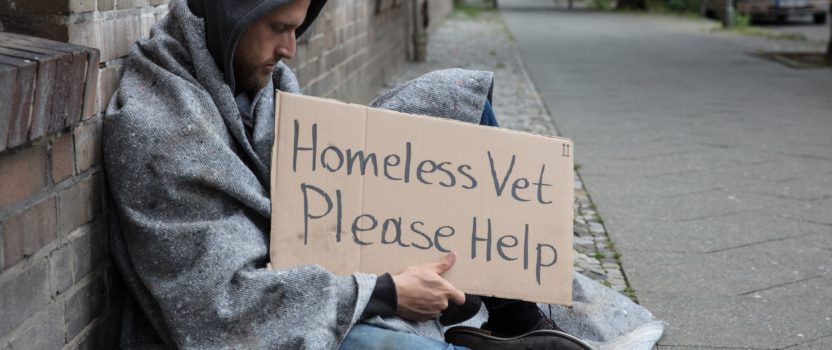Veteran Homelessness Down in Clark County
Fewer than 600 veterans were homeless on a given night in January 2018 in Clark County, according to newly released data from the U.S. Department of Housing and Urban Development (HUD). The HUD report is fresh evidence that the work underway by the U.S. Department of Veterans Affairs (VA) and its federal and community partners to prevent and end homelessness among Veterans is producing the intended results.
The 2018 Point-in-Time (PIT) Count—an annual HUD-led enumeration of America’s homeless population— revealed that overall homelessness among Veterans is down 14 percent in Clark County. Since 2017, the number of unsheltered homeless Veterans decreased 49.1 percent locally, while the number of sheltered Veterans increased by 16.9 percent. Overall, between 2011 and 2018, Clark County saw a 49 percent decrease in the total number of homeless Veterans dropping from 1,169 to 594. While the results are positive and moving in the right direction, local VA leadership emphasized there is more work to be done.
“Reducing Veterans homelessness in Southern Nevada is a public-private partnership and the direct result of numerous federal, state, local and nonprofit agencies working together daily to assist Veterans with shelter, permanent housing and other critical resources,” said Peggy Kearns, Director/CEO of the VA Southern Nevada Healthcare System. “While we have made significant strides, there is still more work to be done. Southern Nevada is a national model for how working together can achieve positive results for Veterans. As such, the VA will continue to be an active partner in helping our community continue to combat Veterans homeless, suicide and any other issues our nation’s heroes face locally.”
To assist in local efforts, the VA Southern Nevada Healthcare System maintains a Community Resource and Referral Center for homeless and at-risk Veterans. As the greater Las Vegas community’s hub for any Veterans requesting homeless services, the CRRC assists with shelter and housing, healthcare, and coordination of other supportive services. CRRC staff members also serve on the Southern Nevada Homeless Continuum of Care board, working directly with a wide variety of community stakeholders committed to ending homelessness locally.
The VA also coordinates with local organizations to provide more than 420 beds in the community via contracts and the VA’s Grant Per Diem Program, which funds community agencies providing services to homeless Veterans. Additionally, in partnership with HUD, the VA manages more than 1,400 vouchers to provide permanent housing to local homeless Veterans in Southern Nevada.
PIT Count data provide a national “snapshot” of homelessness on a given night in America. It is one of many tools that VA staff and partner agencies use to determine where to target resources to help veterans who are homeless or at-risk of homelessness. Nationally, the PIT Count showed that fewer than 38,000 veterans were homeless on a single night in January 2018—a 5.4 percent decrease since January 2017 and a nearly 50 percent decline since January 2010. The number of unsheltered homeless veterans decreased by nearly 5 percent between January 2017 and January 2018. To date, 64 communities of varying sizes, including Clark County, and three states, have effectively ended homelessness among veterans. The PIT Count results revealed that we are continuing to make progress locally and nationally.
“We are proud of the progress of VA and its partner organizations in helping homeless and at-risk veterans become and remain stably housed,” said Michael Taylor, VA director of homeless Veterans outreach. “While there’s more work to be done, the data reported today by HUD shows that the evidence-based strategies that we’re using to help veterans exit homelessness are producing positive and lasting results for veterans who lack stable housing.”
VA has a wide range of programs that prevent and end homelessness among veterans, including health care, housing solutions, job training and education. In Fiscal Year 2017 alone, more than 50,000 veterans found permanent housing and supportive services through VA’s continuum of homeless programs. Between October 2010 and September 2017, more than 600,000 veterans and their family members have been permanently housed or prevented from becoming homeless.
View full article HERE

